#earth king wu
Text
Wu never thought he would be king. This was just a distant daydream. There were so many people in the line of succession to the throne that they were in front of it, and some who were behind were passed to the front. He remembers being taught all the royal manners and trained to be king, only to be sent away
Great-Aunt Queen Hou-Ting never had any children. The next in the line of succession was Wu's father. Dated a Middle Ring woman and got her pregnant, all the scandal. The next Earth King hooking up with a unimportant woman from the Middle Ring. Great-Aunt got mad when Wu was born. He remembers some family fights when he was little.
"He will be Earth King! And his mother is from the Middle Ring! She doesn't even has a last name!"
But Dad taught him everything to be King. Dad told him he would be King, doesn't matter what Great-Aunt said. And Wu was young and naive. He believed him. But then Mom died and Dad met another woman, a important one, one that had a rich family and a last name.
They fell in love, they had children and Great-Aunt likes these children. These children look like royalty with last names.
And then it faded away.
The kids with "the most noble heritage" arrived ahead of him in the line of succession and Wu would no longer be King.
When his first half-brother was born, Wu didn't understand why this boy five years younger than him would be King. Traditions were clear when they mentioned the firstborn, but traditions could distort in favor of what the Queen wants. And then came his half-sister (seven years younger) and his half-brother (nine years younger) and it became clear that he would not be King. Not only did he lose the crown, he lost himself from the royal family.
His father was so focused on his new family, new wife, new children, he forgot his firstborn son. Wu was left to babysitters and tutors.
Wu no longer heard his father say, "You will be a great king no matter what great-aunt says." He barely heard his father. His father was always busy with his new family and new children and his noble son who was going to be king. His father has left behind his past mistake of becoming involved with a Middle Ring woman to focus on the true future of the Earth Kingdom.
Wu's father and stepmother and half-brothers were the heirs of the Earth Kingdom. Wu was just Wu and his father didn't stand him. He stayed as far away from him as possible, making as little contact as possible the few times they ended up bumping into each other in the royal palace. The close relationship Wu had with his father when he was a little child has turned into... nothing. His dad even took his stepbrother's away.
The oldest son talked to Wu in a polite way, but never in a family or friend way, it was like talking to a stranger. The middle daughter basically ran away from him. The youngest son gave him birthday gifts, trying to make friends, but they were never close.
When Wu grew up, his father sent him to Republic City University to study. Wu accepted the invitation somewhat happily. He felt much better at University than at home, where everyone seemed to be running away from him or forbidding people from talking to him.
In the time he spent at RCU, he did not write to his family once or receive any letters from them. The only time he received a letter from home was one signed by Grand Secretariat Gun himself, appearing to be sent directly from a dream, saying that Wu would be Earth King.
He would be king.
He would be king, and he would be an admired king, an adored king. Now that he would be king, he would always be in the spotlight. People wouldn't walk past him to talk to his brothers now that he would be king. His father wouldn't abandon him now he would be king. Great-Aunt wouldn't hate him because now he would be... in her place.
The realization of what would have to happen for him to become king hit him like a train. He was sad, but his emotions and thoughts fought. The ones who died were his father and his great-aunt, but his father abandoned him a decade and half ago and his great-aunt hated him.
Between the confusion regarding his family and the happiness of being the future king, Wu thought "This monarchy is really strange sometimes."
#this is probably not that good but i dedicate it to the half a dozen people that love wu#his family always made me curious because hou-ting was his great aunt#there was his parents and grandparents in front of him in the succession line and they are never mentioned in the whole show?#also never in the comics?#wu's family basically suffered a massacre and no one is talking about it?#he's basically a canon orphan and this is never mentioned?#wu#prince wu#king wu#earth prince wu#earth king wu#earth kingdom#wuko#sort of#half of wuko#maybe a write a wuko sequel to this one#some day#this was in my drafts for too long
24 notes
·
View notes
Text
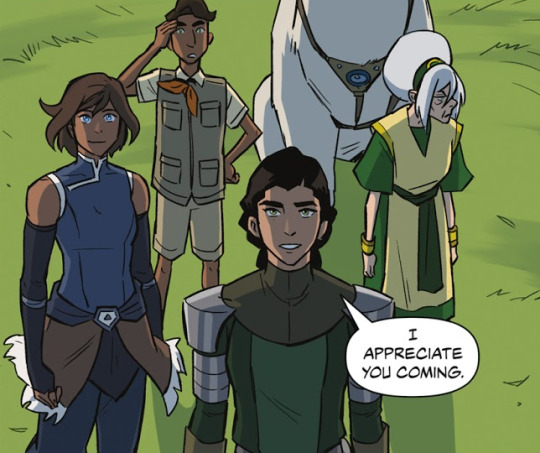
#l.o.k. comicbooks#Avatars#Avatar Korra#Korra#Asami Sato#Toph Beifong#earth king Wu#Naga#Polarbear-dog#Kuvira
14 notes
·
View notes
Text
The idea of a kid Wu befriending little Kuvira and the Beifong babies is driving me insane. Just Su's pack of feral children kidnapping this repressed little prince and going on a fun day in Ba Sing Se, while evading the Dai Li. Then they bring Wu to Su and she's immediately like 'well your Great aunt sucks, you're my kid now.'
#just. baby earth nation nobility going feral#prince wu#king wu#kuvira#su beifong#suyin beifong#baatar#baatar jr#huan beifong#opal beifong#wing & wei#wing beifong#wei beifong#tlok#avatar the legend of korra#the legend of korra#legend of korra#avatar legend of korra#avatar#atlok
37 notes
·
View notes
Text
Now It’s time for me to pitch to everyone the Greatest Crossover of all time
(more popular than whatever the heck Infinity War and Endgame was).
TGCF x ATLA
Spoilers if you haven’t read and watched TGCF and watched The Last Airbender. Now here’s the worldbuilding!
-First things first, Avatars can’t ascend, because they keep reincarnating to continue the cycle, but they’ll occasionally be summoned to Heaven to help bring that 3rd realm balance with whatever help they can offer.
-Fire Lords can’t ascend because… they attacked.
-Heaven didn’t do jack squat to prevent the Air Nomad Genocide mainly because they were busy trying to defeat ghosts plaguing the land.
-The Windmaster wouldn’t be worshipped by the air nomads, but the Earth Kingdom worships Shi Qingxuan. Shi Wudu is worshipped in the Water Tribe and Earth Kingdom, same as the Rainmaster. The Earthmaster? You guessed it, Earth Kingdom. My OC, Leishi Ying, the Thundermaster is worshipped in the Earth Kingdom and Fire Nation. Tl:dr, all Elemental Masters are worshipped in the Earth Kingdom because of it’s diverse Geography and inspiration from ancient China.
-Toph could be a good candidate for the next Earthmaster, she wouldn’t need the shovel but a lot of the Heavenly officials would low key remind her of her parents. So Bumi would totally be valid as the next earthmaster since he’s very intelligent with his creative mind. Heck Katara would be a good candidate for the water master, look at how far she’s come in Book 3.
-I don’t think Sokka would ascend as a martial god, I think he would totally ascend as a Civil God because he’s a strategist. An interaction between him and Ling Wen would be similar to the time he trained under Master Piandao. Now imagine an interaction between him, Fu Yao, and Nan Feng.
-During Xie Lian’s 3rd Ascension to Heaven, a certain Cabbage Merchant happened to be really close in his vicinity… yeah I’ll let you guys guess what happened next.
-Aang and his friends wouldn’t need to ascend, they could just fly straight up there on Appa
Yeah, this was fun. Plz expect Thoughts I had on TGCF Season 2 February! Should I or shouldn’t I, do a part 2?
#tgcf#tian guan ci fu#best crossover ever#avatar the last airbender#atla#shi qingxuan#shi wudu#Ming yi#yushi huang#Tgcf oc#Jun wu#toph#earth king bumi#Katara#sokka#ling wen#piandao#fu yao#nan feng#nan yang#xuan zhen#Feng xin#mu qing#xie lian#cabbage merchant#avatar aang#appa#Tgcf x atla#heaven official's blessing#Cabbage merchant
26 notes
·
View notes
Text
I so desperately want a massive political history of The Earth Kingdom. If I could have any other thing from the world of ATLA/LOK — book, show, comic, game — it would be that. Bc I am so interested in it.
🚨 Spoilers for every thing — Yangchen and Kyoshi books, ATLA, LOK, Comics, etc. 🚨
The earliest we hear about an actual Earth Kingdom and Earth Royal family is in F.C. Yee’s Yangchen books. At this point, the Earth Kingdom has just gone through a civil war, wherein the White Lotus manipulated the Water Tribes and Fire Nation to sponsor a challenger to the throne, which is wild. The challenger was defeated and the Earth Kingdom entered a period of intense isolationism. There are a handful of port cities where foreign trade is allowed, with incredibly powerful governors who actively manipulate the system to build their wealth at the expense of the citizens. The Earth King is paranoid af, to the point that he is donning disguises and sneaking around to catch plots against him. And some of these governors are actively plotting against him and inventing new weapons of mass destruction (combustion benders) in order to usurp him.
The next we see of the Earth Kingdom is in the Kyoshi novels were it’s a devolved mess of warlordism. Various daofei groups had taken over parts of the inner provinces and the Earth Monarch was incredibly weak. There’s also the whole Wars of Secrets and Daggers scramble for the throne, which is only mentioned.
According to the Wiki, in the online comic Escape from the Spirit World, Kyoshi pressured the ineffective 46th Earth King to adopt a constitutional monarchy in order to prevent further oppression. This occurred in the aftermath of a peasant revolt that occurred after the death of Chin the Conquerer.
Avatar Legends then gives us a King Jialun, who reversed many of the progressive changes of this constitution and murdered the sages who agreed with Kyoshi in “The Night of the Silenced Sages.” The government was recorrupted, but no other successor had the same power as Jialun. So the Earth Kingdom monarchy was corrupt but weak.
Then we next see the Earth Kingdom with King Kuei (the 52nd Earth King). According to the old website, he ascended to the throne at the age of 4, which is why Long Feng — who served as regent — was able to essentially takeover.
But based on what we see in the show, the Earth Kingdom has completely splintered. The Earth King only has power in Ba Sing Se, and that power is only ceremonial. He is unaware of the 100 year war and completely inept to rule. Then it’s Azula and the fire nation takeover.
In the comics that come between ATLA and LOK, King Kuei, without the influence of Long Feng, takes an active role in the governance of the Kingdom. He is willing to go to war over the colonies in “The Rift,” but is also willing to be shown wrong. He was instrumental in the peace after the war and fully restored the monarchy as the full power of the Earth Kingdom government.
Then we get to LOK. Hou Ting is a fairly powerful, incredibly corrupt monarch. She tried to exert more control over the people, especially the outer provinces. She’s then killed by Zaheer. The power vacuum is ultimately filled by Kuvira, a non-dynastic dictator who rules by force and sponsors brain washing and the forced removal of Fire and Water nation descendants. The next dynastic ruler is Wu (whom Kuvira had usurped). He is Hou Ting’s great-nephew, and at least third in line from her. He is the only surviving member of the dynasty and seems unprepared to rule at his coronation, after three years of living in Republic City.
After the whole Kuvira thing is taken care of (Book 4 of LOK), Wu then decides to abdicate and democratize the Earth Kingdom. The post-canon comics (Ruins of Empire) show the struggles and setbacks of this, but ultimately reaffirm this path.
And I am so obsessed with this whole history. There are, according to the Wiki, at least 2 dynasties, the Hao and the Hou Ting. It resembles Chinese history, but doesn’t just follow it. There’s dynastic decline and really interesting incidents that I wish were more fully fleshed out. Not to mention as the centralized monarchy weakens, you see the rise of local powers, like the King of Omashu. I just find the whole thing so fascinating and I wish I had a comprehensive book.
#avatar legend of korra#avatar the last airbender#king wu#prince wu#avatar#avatar last airbender#my theories#my thoughts#earth kingdom#king kuei#queen hou ting#earth royal family#earth monarch
24 notes
·
View notes
Text
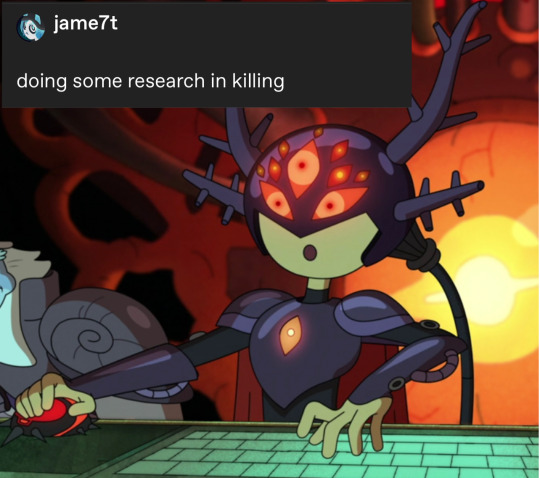
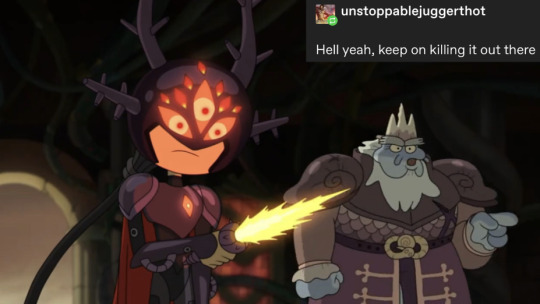


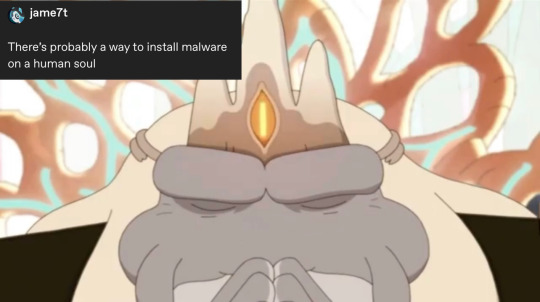
poisons you poisons you poisons you poisons y
#darcy wu#king andrias#amphibia#amphibia meme#everytime we post we inflict 100 trillion poison damage to earth#lab accident
56 notes
·
View notes
Note
in secret zaofu is referred to as not part of the earth kingdom but isnt it? like yeah it's isolated from the rest of the mess but It's still part of it.
Interesting question! As I've always understood it, Zaofu is autonomous in its governing. Su runs the city herself as the 'Matriarch', refers to herself as it's leader, calls it her city, openly trash talks the queen, and the wiki refers to Zaofu as an "Autonomous City State". So geographically it's within the Earth Kingdom, and I'm sure before Su bought that plot of land, the empty land itself may have been technically under the sovereignty of the Earth Queen, but apart from when Kuvira invaded, its government has always been separate from the Earth Kingdom. And I think once Kuvira was defeated and Wu took over, he would have just handed Zaofu back over to Su. But, it's not a democratic city, Su is in charge.
So what I was mentioning in Secret, is that Su would be very intrigued by the fact that Wu is doing exactly what she was trash-talking Hou-Ting for not doing: Abdicating and reforming the Earth Kingdom to help it evolve with the times. And with that in mind I think Su would be curious about the progress of the democratization and consider reforming Zaofu in a similar way, and then joining under the umbrella government for the Earth Republic or Democractic States or whatever they're going to end up calling it.
#prince wu#suyin beifong#king wu#Zaofu#answered ask#anonymous#if i've misunderstood Zaofu's deal I'd be eager to hear what i've missed#but I'm pretty sure in canon they do not answer to the earth monarch
7 notes
·
View notes
Text
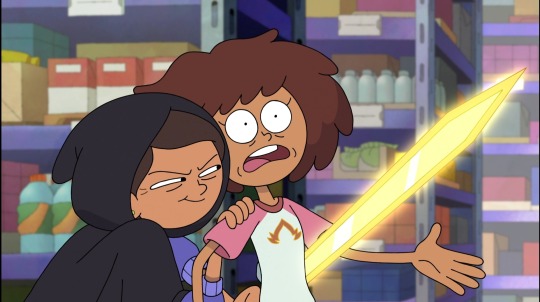
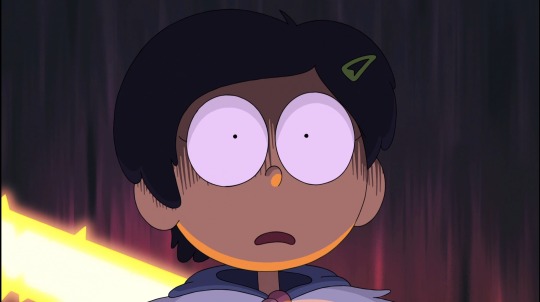
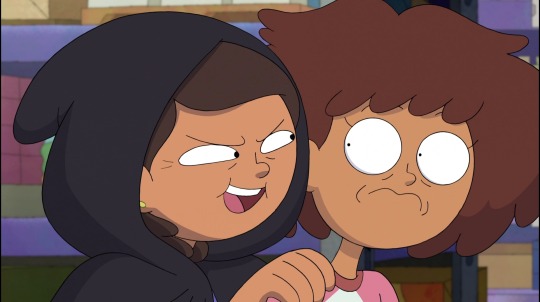
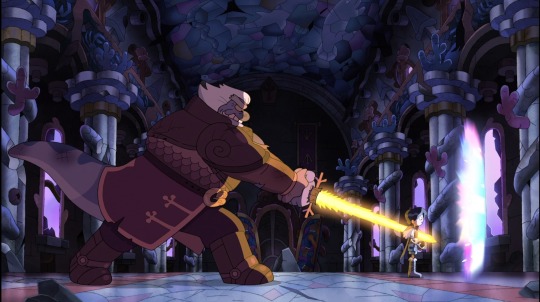
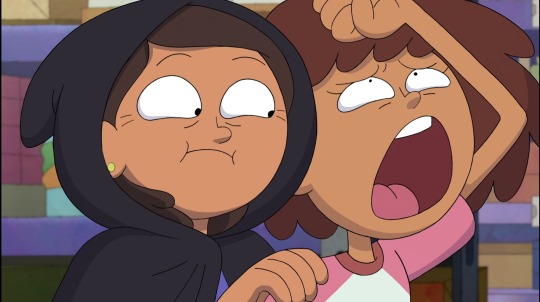
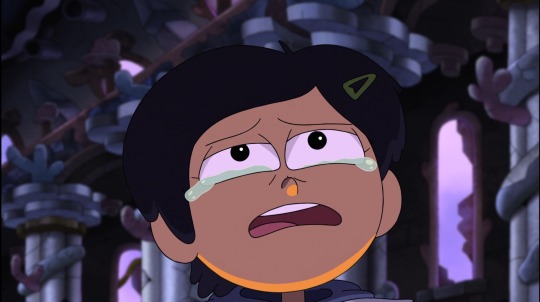
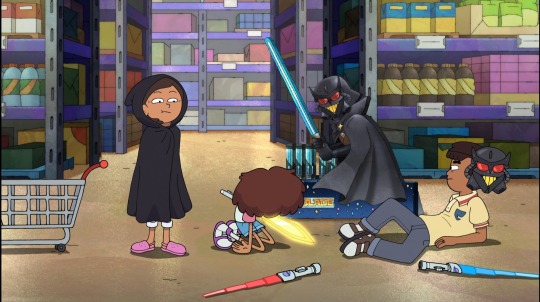
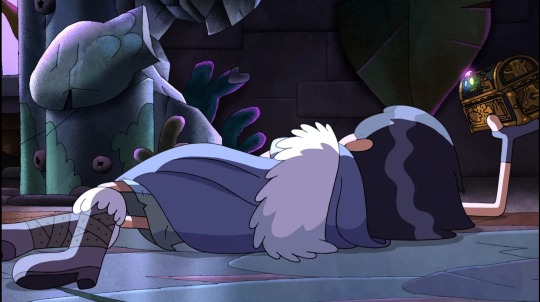
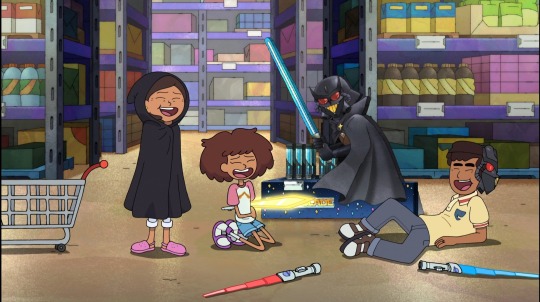
I Iike Anne, but seeing her treating Marcy's possible death like a joke here is something I don't think I'll easily let go of. I love Season 3 and the lighthearted Earch episodes, but they barely showed that any of the Characters (especially Anne and Sasha) were affected by what happened to Marcy.
#i'm getting salty about season 3 again#and anne witnessing marcy get stabbed but then spends the season having fun with her family like it never happened is a big one#i still think that they went too deep in lighthearted after true colors#did anyone on earth truly care about marcy?#amphibia#anne boonchuy#marcy wu#oum boonchuy#bee boonchuy#king andrias#a scene that should've triggered some trauma but nope#some friends you got there marcy#i don't like being salty about this#but that's how i feel
55 notes
·
View notes
Text
one thing I’d really love to see as an audio drama extra:
- the missing scene of Hua Cheng & He Xuan & the newly dead Earth Master
#tian guan ci fu#Heaven Official's Blessing#tgcf#hua cheng#spoilers#he xuan#might write this myself while on my ghost king bros kick#i'm just picturing hua cheng coming home from his first outing with gege after 800 years#rudely cut short by some jerk firing an sos signal from his house#and just seeing black water standing over the dead body of the guy he's been impersonating for hundreds of years. the audacity???#some questions he'd have 1) 'what the actual hell?' 2) 'what did you do?' 3) 'wasn't this guy supposed to be a prisoner at YOUR house?'#he xuan mumbles something about a time limit refuses to answer if he killed my or not#and it all ends with a very pissed off hc making it clear that gege is not to be involved in anything#and also 'come with me because someone is going to be investigating this sos and the earth master they find better be the one they know.'#(a very-definitely-staged pummeling ensues)#on a side note i still question jun wu covering for ming yi 'oh he's been undercover at ghost city for 10 years' was he really????#was this bwx's all according to keikaku?#was it just something he said knowing xl wasn't going to go verify it?#was this something my & hc came up with so my could hang out in ghost city occasionally?#was he actually spying on hc for jw because he needed the money?#i am very sad that hx turned out to be a completely independent actor because there was total team up potential between him and bwx#random tgcf thoughts
6 notes
·
View notes
Text
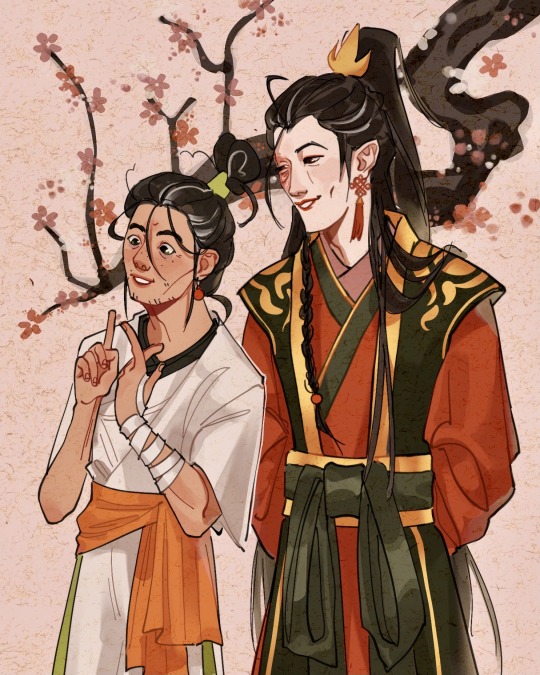
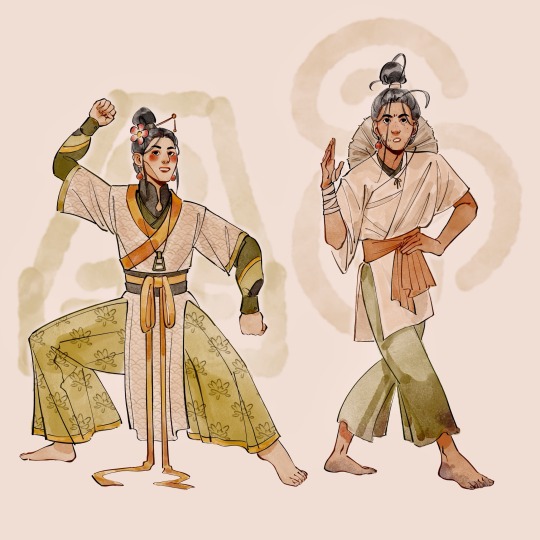
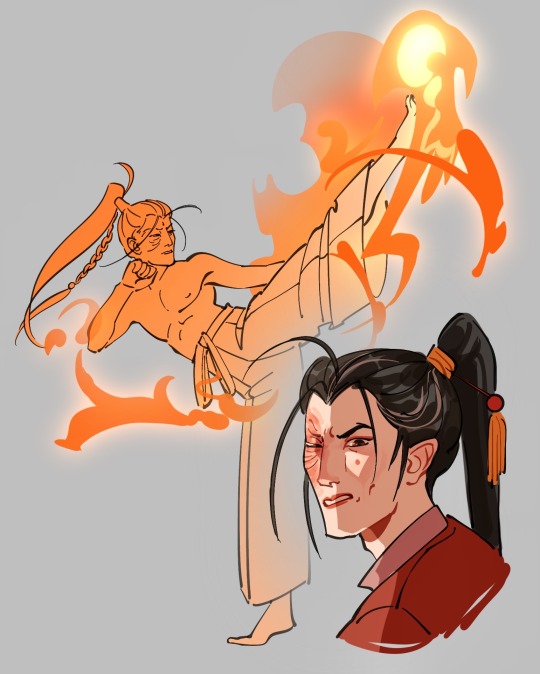
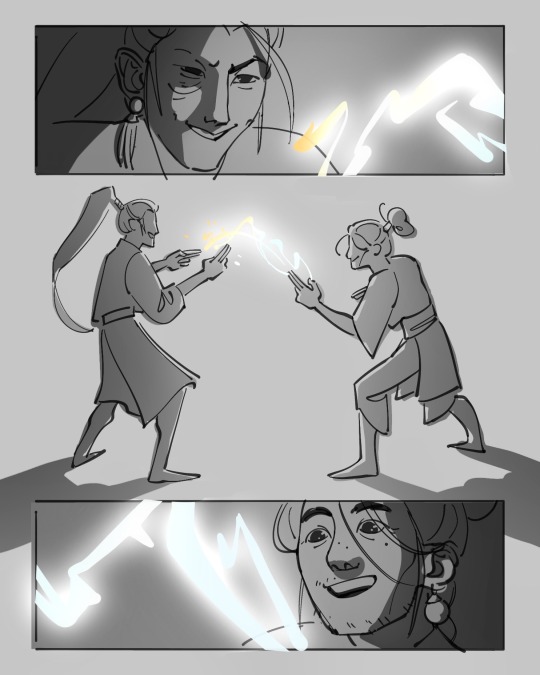
fire, air, water, earth.
prince xie lian is one of the most promising up-and-coming avatars the world has yet to see. that is, until disaster strikes his home earth kingdom of xianle. when his people die out at the hands of a plague spirit, bai wuxiang, the nations blame the avatar.
with his reputation destroyed, xie lian joins the air nomads for 20 years and travels the world as a scrap-collector. although he has lost the respect of the people he is destined to protect, the spirit world is thrown into chaos without his guidance. xie lian works thanklessly to maintain global balance all on his own. but unbeknownst to him, there's one person, upon the throne of the fire nation, who still believes in the avatar.
welcome to my tgcf x atla au!
click here to follow this tag for updates. read more below for my story notes.
STORY
xie lian is born to the king and queen of an earth kingdom city-state, xianle, and is quickly discovered to be the avatar. a wildly talented one, at that. he learns firebending second, and waterbending third. still young and pampered, xie lian struggles with the humility associated with airbending principles.
at just the age of 17 he begins to travel the world to master the four elements and [katara narrator voice] to restore peace and balance in the world. he acquires a servant (firebender mu qing) and a bodyguard (earthbender & childhood best friend feng xin). it's during this time that he tours the fire nation, meeting with political figures and impoverished citizens alike, gaining a positive reputation for his determination and skills. to celebrate the summer solstice, xie lian is the face of a festival in which he proves his elegance, combative strength, and firebending prowess. during the ceremony, he controversially interrupts it to save the life of a 10-year-old urchin boy.
the lines between the spirit and mortal worlds bleed together during solstices. it's xie lian's festival which attracts a particularly violent spirit to emerge into the mortal world: bai wuxiang. the white-clothed calamity.
xie lian's life is filled with promise until he turns 22. he catches word of a disaster taking place in his home kingdom. he puts a pause on his tour of the nations to return to xianle. there, he finds that a strange and highly contagious disease has begun plaguing his people. its symptoms are unnatural; the work of an angry spirit. xie lian works himself to the bone trying to save his common people. he fails.
when xianle falls to plague, to chaos, to fear, its people blame the avatar. he is dubbed the avatar of misfortune. a failure. xie lian's reputation crumbles to dust and he is helpless to restore his people's faith in him. when the rest of the world learns of how xianle came to ruin, the avatar becomes not a figure of peace to be revered, but a bad omen.
having lost his two companions, his parents, his kingdom, and the global adoration he's come to rely on for his self-worth, xie lian runs away. he disowns his past identity and seeks to start a new life. he finds himself in the northern air temples, where the air nomads pay him no mind, although xie lian is a bit of an oddball. (xie lian might look rougher and jaded but they certainly recognize the avatar. they pretend to not know him—the nomads keep to themselves and as long as xie lian doesn't cause trouble, he is welcome.) he eventually befriends a monk named shi qingxuan.
xie lian seeks enlightenment. he incorporates himself into the monks' way of life, releasing all ties to material possessions and worldly indulgences. he abstains from sex, alcohol, anger, and, hardest of all, grief. he goes on to live 20 years as a scrap collector, practicing what he was taught by his teacher and guide, monk wu yong. xie lian knows it's time to leave the temples when he finally masters airbending.
humbled, xie lian rekindles his fighting spirit. the common people loathe the avatar, but he forgives them. he will save them.
as xie lian wanders the nations, he learns that during his darkest years, literature, art, and scholarly works of the avatar have been destroyed. most people don't even remember what he looks like and much less have the means to learn anything about him. (hua cheng carving xl's face into the side of a mountain: HOLD MY BEER)
meanwhile, there is a fire nation urchin boy who has grown into someone powerful enough to be feared. through his unmatched wit and charisma, he has worked his way up the capital's political hierarchy. a city governor who calls himself hua cheng, is the first aristocrat to challenge the firelord to an agni kai. he is also the first to win. he delegitimizes the royal bloodline and single-handedly reshapes a generation's idea of a competent ruler. bonus points for the previous firelord being xie lian's indecent cousin, qi rong.
now 35 years old, the new firelord, terrifying yet respected by all, leads his people to prosperity and vanquishes every enemy. peculiarly, he seems somewhat uninterested in his position of power. instead, he enjoys turning his attention towards erecting a shrine, a palace, in honor of avatar xie lian.
HUALIAN'S BACKSTORY
the avatar preceding xie lian, jun wu, oversaw great conflicts between the four nations. it is during one of these wars that a seemingly insignificant teenager dies. his soul drifts aimlessly in the spirit world, vulnerable, alone. he encounters the trickster spirit koh who steals his face. time is hard to account for in this realm, and the once-a-teenager forgets his past life, his own identity, simply choosing to refer to himself as wu ming: nameless. many years later, the avatar cycle begins anew with the birth of xie lian.
at 7 years old, prince xie lian and his best friend feng xin are outdoors playing with swords. feng xin takes a break, as he is called inside by the king of xianle, leaving xie lian outside and unsupervised. (feng xin will shortly be told that xie lian is not only his friend, but now his responsibility.) meanwhile, xie lian is left without a sparring partner. until a ghostly silver butterfly flits in front of him. it playfully weaves around the flourishes of the blade. xie lian chases it, away from the palace grounds, across the fields and into the brush, where he falls head-first through a burrow. when he stands up, his sword has disappeared, but not the butterfly. it pulls his attention upward, where he takes in his surroundings: the spirit world.
xie lian continues to play and greet spirits, who are all pleased to meet the new avatar, eventually finding a sad, dissipating ghost fire. the ghost introduces itself as wu ming. xie lian works very hard to cheer it up, promising they'll be friends in this lifetime and the next. wu ming brightens and confesses that koh has stolen its face. xie lian fails to tolerate this news: if he's to be the avatar, he must protect the innocent and slay monsters. with wu ming's warnings, he marches to koh's den to demand his friend's face back.
xie lian succeeds. wu ming doesn't remember much these days, but he's sure that no one has ever showed him such incredible kindness. when wu ming expresses his desire to disappear, xie lian gives him a mantra: "live for me."
xie lian has to leave, to return to a very worried feng xin (who is scared he's already failed his new bodyguard job on day one), but wu ming is invigorated with life like never before. his soul persists, stubbornly, for the avatar. he is reborn back into the mortal world as a fire nation boy. although, the encounter with koh would leave a mark on his body: the sclera of his right eye would be an unsettling blood red. the people of his village would know him as hong hong-er.
elsewhere in the spirit world, the ghost of avatar jun wu senses young xie lian's presence. he also senses the persistence of the ghost fire—a soul reborn. could he, too, return to the mortal world? jun wu entertains a simple but horrifying thought: by swapping places with xie lian, could he achieve immortality as the world's last avatar? thus, jun wu hatches a plan. he strikes a deal with bai wuxiang, the white-clothed calamity, a malevolent plague spirit. bai wuxiang would possess the body of jun wu to eliminate the new avatar. to kill xie lian, and to be reborn.
the plan doesn't go—well, according to plan. the people of xianle are wiped out before he can get his hands on xie lian, and the destruction of a people leaves behind a universal distrust of the avatar. jun wu realizes he would be unable to seize power in such an environment. his new strategy must involve controlling young xie lian, manipulating him into a puppet. it takes a while to pin him down, but jun wu eventually finds him settled in the northern air temple, at his most emotionally vulnerable. jun wu will impersonate a monk teacher, changing his name to wu yong. he will bide his time and play his cards until the world is ready for his return.
EXTRAS
hualian are middle-aged men in this au because it makes sense timeline-wise, but also because sexy silver fox xie lian is what i see every time i close my eyes.
narratively, i'm torn between hua cheng loving the avatar, or hua cheng loving xie lian. thinking about this timeless lovestory, "you, not the state of you," i can see it both ways. hua cheng might love the avatar, xie lian and all of his reincarnations regardless of their body. or, he might love xie lian, regardless of the "avatar" title. ("avatar" may also be this world's equivalent to hua cheng respectfully calling xie lian "dianxia".)
firelord hua cheng presents himself at what he believes is his ugliest, most intimidating form: exposing his burned right eye. as san lang, however, he is at first ashamed to reveal such a vulnerable part of him in front of his love; he covers it with an eyepatch. (the people of the fire nation are like: "a platypus?" [san lang takes off his eyepatch] "PERRY THE PLATYPUS?!?!")
hua cheng teaches xie lian how to bend lightning. they easily trade bolts back and forth to each other in a cute and intimate way. feng xin and mu qing are horrified when they first see this in action.
hualian's first kiss happens when they're battling a sea monster underwater and xie lian loses his concentration enough to accidentally pop hua cheng's air bubble. a little mouth-to-mouth resuscitation will do the trick until they can float back up to the surface.
ruoye = xl's spiritual serpent guide (kind of like roku's dragon)
e'ming = hc's super clingy fire ferret
#hualian atla au#tgcf au#atla au#xie lian#hua cheng#hualian#hualian au#jun wu#tgcf#tian guan ci fu#heaven official's blessing#mxtx#my art
323 notes
·
View notes
Text
TGCF: My theory on the inspiration behind the 4 calamities
In some of the oldest Chinese myths and legends, there are 4 guardian gods of the four cardinal directions - the green dragon, white tiger, crimson bird, and black tortoise, and each have a colour, season and element associated with them.
I'm not sure if anyone has made this connection before, but I'm writing it down if anyone is interested. There are spoilers about the calamities' identity.
First, the 青龙 (qing long, green dragon) --> Qi Rong, Night-touring Green lantern.
The qinglong's territory is the East, and its colour is qing, which means green, or turqoise. Its element is wood, and its season is spring. Closely associated with royalty and the imperial family.
Now, for the similarities with our favourite green goblin. "qing" is literally the colour in Qi Rong's title, and his colour scheme. Qi Rong has a habit of hanging corpses from trees, which may be his relation to the element "wood". He does not have any obvious coleration with the season "spring"- perhaps he was born in spring. He is royalty, part of the imperial family as cousin to the crown prince.
Second, the 白虎 (bai hu, white tiger)--> Bai Wuxiang, White Clothed Disaster upon the Earth.
The baihu's territory is the West, its colour is white, element is gold/metal, and its season is summer. It is the king of all beasts, associated with disease and war, often used as a guardian symbol by soldiers.
On the other hand, Jun Wu's title, alias and colour scheme are all white, and has plenty of weapons that may be his link to the element of "gold/metal". I don't think he has anything to do with summer, but feel free to correct me if I'm wrong. He is king of the gods, a god of war, and the one to spread the human face disease.
As east and west are considered a pair, the guardian spirits are meant to reflect each other. In Chinese poems and such, symmetry is important, and both Qi Rong and Jun Wu were princes, one becoming revered by the highest of gods, covered with masks and false identities, one becoming the object of disgust by the lowest of ghosts, using his real name and face. There is a certain poetic symmetry to it, don't you think?
To the second pair. The 朱雀 (zhu que, crimson bird)----> Hua Cheng, Crimson Rain Sought Flower
The zhuque rules over the south, its colour is red, element is fire, and its season is summer. It is the king of all birds, more powerful than even the phoenix, immortal and undying. As such, in many places it is also considered a symbol of life.
Now, to the most popular ghost king: Hua Cheng. The english translation of his title is "crimson", and his colour scheme is indubitably red and autumn-y shades. He also re-re-met Xie Lian in autumn ( I think - I mean, the leaves were all red in the donghua??), and has died again and again to return like the zhuque. He is the king of all ghosts, with a great determination to live(sorta? are ghosts alive??) for his love.
Lastly, my personal favourite, the 玄武 (xuan wu, black tortoise)---->He Xuan, Black Water Sinking Ships
The xuanwu, also called a tortoise, is actually the only spirit to be a combination of 2 animals, a snake and a tortoise. It rules over the north. Its colour is black( sometimes depicted as dark blue), element is water, and its season is winter. In earlier legends, he is considered a guide and guardian to the netherworld, of death and of long life.
Thus, to our poor indebted water ghost. He Xuan's name is "xuan", the same! goddamn! character! as the spirit! His title and colour scheme are all to do with the colour black, and he is a water ghost because he died because of the Water Master. He has been marked by death, yet survived and vowed revenge. This, and the fact that his house is called the Nether Water Manor, is probably his relation to the netherworld of the xuanwu.
To the pair of south and north. Both Hua Cheng and He Xuan have suffered and suffered again, yet Hua Cheng chooses to linger on due to hope and love, and He Xuan due to revenge and hatred. But hatred and love are two sides of the same coin. If Hua Cheng hadn't experienced the hatred from his childhood, he wouldn't have thrown himself from the city wall and met Xie Lian. If He Xuan hadn't loved his family, so much, he wouldn't have broken that hard after their deaths to lose himself to hatred and empty vengence.
Aaaaaand that concludes this essay. Keep in mind that this is a theory, and probably even isn't true, but if anybody wants a more detailed description of the guardian spirits, or to know more about the similarities between the mythical creatures of ancient china and tgcf, I will be more than happy to make a part 2.
Thanks for reading!!
#he xuan#tgcf#bai wuxiang#hua cheng#qi rong#four great calamities#heaven official's blessing#tian guan ci fu#black water submerging boats#black water sinking ships#night-touring green lantern#crimson rain sought flower#white-clothed calamity#shan hai jing#meta#tgcf meta
478 notes
·
View notes
Text
Breaking my silence. Wuko's an underrated ship. It's cute. It's giving twink4twunk. The sheer comedic potential? Unmatched. The possibility of them both growing as people by being part of each other's lives? Beautiful. Wu becoming more empathetic and down to earth and Mako learning that existing is something a person can actually enjoy instead of just suffering through? I am scraping my plate clean and getting back in line for seconds. Also like. Mako growing up homeless and starving and then dating a literal king? Cinderella moment. Love that for him.
679 notes
·
View notes
Text
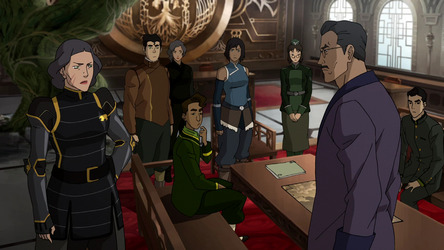
#book 4#Avatars#Avatar Korra#Korra#Bisexual#L.o.K.#Lin Beifong#Raiko#benders#non-bender#Earth king Wu#Mako#Zhu Li Moon#Suyin Beifong
13 notes
·
View notes
Text
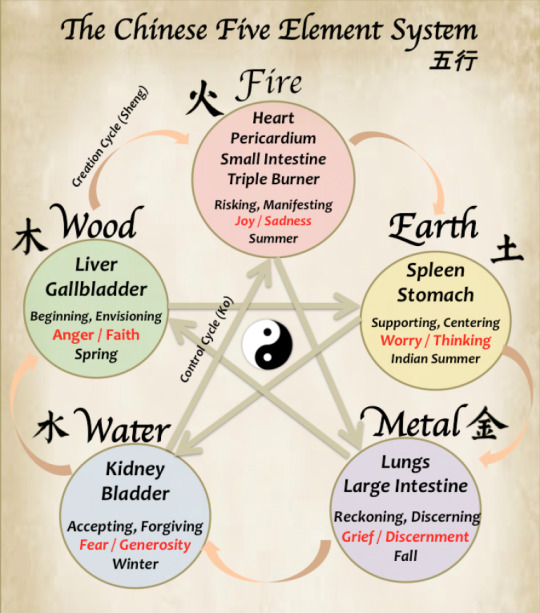
Legends of the humanoids
Reptilian humanoids (5)
Wuxing – the connections between the Five Dragon Kings (Ref) and the Five Elements philosophy
To better understand the origins of the Five Dragon Kings and the ancient Chinese legend, it is worth mentioning the wuxing of natural philosophy, which states that all things are composed of five elements: fire, water, wood, metal and earth.
The underlying idea is that the five elements 'influence each other, and that through their birth and death, heaven and earth change and circulate'.
The five elements are described as followed:
Wood/Spring: a period of growth, which generates abundant vitality, movement and wind.
Fire/Summer: a period of swelling, flowering, expanding with heat.
Earth is associated with ripening of grains in the yellow fields of late summer.
Metal/Autumn: a period of harvesting, collecting and dryness.
Water/Winter: a period of retreat, stillness, contracting and coolness.
The wuxing system, in use since the Han dynasty (2nd century BCE), appears in many seemingly disparate fields of early Chinese thought, including music, feng shui, alchemy, astrology, martial arts, military strategy, I Ching divination, and traditional medicine, serving as a metaphysics based on cosmic analogy.
The wuxing originally referred to the five major planets (Jupiter, Saturn, Mercury, Mars and Venus), which were thought of as the five forces that create life on earth. Wu Xing litterally means moving star and describes the five types of Qi (all the vital substances) cycles through various stages of transformation. As yin and yang continuously adjust to one another and transform into one another in a never-ending dance of harmony, they tend to do so in a predictable pattern.
The lists of correlations for the five elements are diverse, but there are two cycles explaining the major interaction. The yin-yang interaction, which by increasing or decreasing the qualities and functions associated with a particular phase, it may either nourish a phase that is in deficiency or drain a phase that is in excess or restrain a phase that is exerting too much influence (see below):
The Creation Cycle (Yang)
Wood feeds Fire
Fire creates Earth (ash)
Earth bears Metal
Metal collects Water
Water nourishes Wood
The Destruction Cycle (Yin)
Wood parts Earth
Earth dams (or absorbs) Water
Water extinguishes Fire
Fire melts Metal
Metal chops Wood
The Huainanzi (2nd BCE) describes the five colored dragons (azure/green, red, white, black, yellow) and their associations (Chapter 4: Terrestrial Forms), as well as the placement of sacred beasts in the five directions (the Four Symbols beasts, dragon, tiger, bird, tortoise in the four cardinal directions and the yellow dragon.
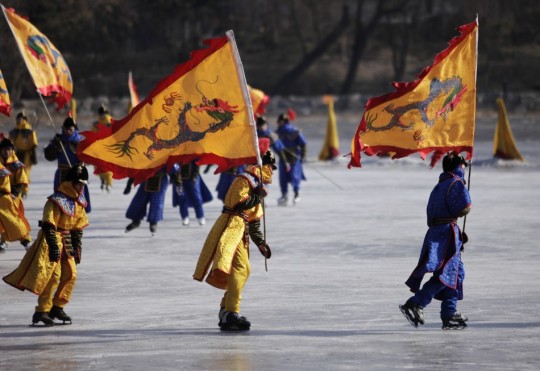
伝説のヒューマノイドたち
ヒト型爬虫類 (5)
五方龍王(参照)と五行思想の関連性
ここで、五方龍王の起源、そして古代中国の伝説をよく理解するために、万物は火・水・木・金・土の5種類の元素からなる、という自然哲学の五行思想について触れておきましょう。 5種類の元素は「互いに影響を与え合い、その生滅盛衰によって天地万物が変化し、循環する」という考えが根底に存在する。
五行は次のように説明されている:
木は、春の豊かな生命力、動き、風を生み出す成長期。
火は、夏の太陽の暖かさの下で行われる成熟の過程、熱で膨張する時期。
土は、晩夏の黄色い野原での穀物の成熟に関連している。
金は、秋の収穫、収集、乾燥の時期。
水は、冬の雪に覆われた暗い大地の中に潜む新しい生命の可能性と静寂の時期。 漢の時代 (紀元前2世紀頃) から使用されてきた五行説は、音楽、風水、錬金術、占星術、武術、軍事戦略、易経、伝統医学など、中国初期の思想の一見バラバラに見える多くの分野に登場し、宇宙の類推に基づく形而上学として機能している。
五行とは文字通り「動く星」を意味し、五種類の気(生命維持に必要なすべての物質)が様々な変容の段階を経て循環することを表している。陰と陽は絶え間なく互いに調整し合い、調和の終わりのないダンスで互いに変化していくため、予測可能なパターンで変化する傾向がある。
五行の相関関係は多様だが、主要な相互作用を説明する2つのサイクルがある。陰陽の相互作用は、特定の相に関連する資質や機能を増減させることで、不足している相に栄養を与えたり、過剰な相を排出したり、影響力を及ぼしすぎている相を抑制したりする (以下参照):
相生(陽)のサイクル
木は燃えて火を生む
火が土 (灰) をつくる
土は金属を産出する
金属は表面に水を集める
水は木を育てる
相克(陰)のサイクル
木は大地を構成する
土は水を堰き止める
水は火を消す
火は金属を溶かす
金属が木を切る
『淮南子』(紀元前2世紀)には、五色の龍(紺碧・緑、赤、白、黒、黄)とその関連性 (第4章: 地の形)、五方位への聖獣の配置(四枢の四象徴獣、龍、虎、鳥、亀、黄龍)が記述されている。
#wuxing#5 dragon kings#5 elements#taoism#yin yang#humanoids#legendary creatures#hybrids#hybrid beasts#cryptids#therianthropy#legend#mythology#folklore#dragon#nature#art
118 notes
·
View notes
Note
I've heard the idea that Monkey is 7 times immortal thrown around a couple times, but my count has only ever gone up to 4 (the peaches, the pills, the wine, and his daoist studies). How immortal IS Monkey?
I count at least six levels of immortality.
1) Daoist Longevity Arts - Ch. 2
I discuss the exact methods here.
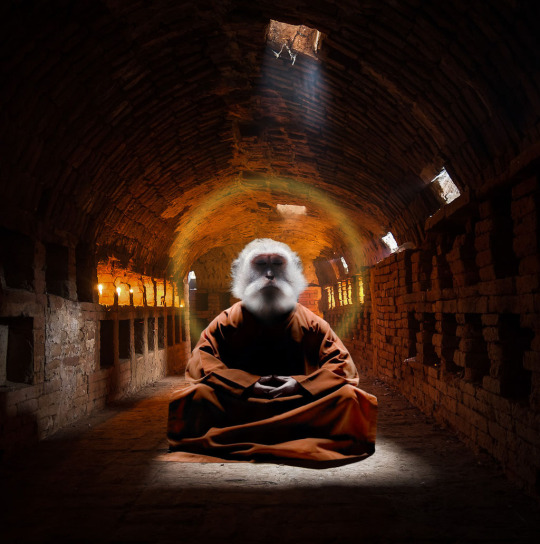
A photomanipulation by me.
2) Erasing Allotted Lifespan - Ch. 3
[After Monkey is summoned to hell in his sleep and thereafter threatens to beat the Judges of Hell for their mistake] The Ten Kings immediately had the judge in charge of the records bring out his [Sun's] books for examination. The judge, who did not dare tarry, hastened into a side room and brought out five or six books of documents and the ledgers on the tens species of living beings ... He [Monkey] had, therefore, a separate ledger, which Wukong examined himself. Under the heading "Soul 1350" he found the name Sun Wukong recorded, with the description: "Heaven-born Stone Monkey. Age: three hundred and forty-two years. A good end."
Wukong said, "I really don't remember my age. All I want is to erase my name. Bring me a brush." The judge hurriedly fetched the brush and soaked it in heavy ink. Wukong took the ledger on monkeys and crossed out all the names he could find in it. Throwing down the ledger, he said, "That ends the account! That ends the account! Now I'm truly not your subject" (Wu & Yu, 2012, vol. 1, pp. 140-141).

A print from the Japanese children book Son Goku (1939).
3) Immortal Peaches - Ch. 5
[After being appointed the guardian of the Queen Mother of the West's immortal peach groves] The Great Sage ... asked the local spirit, "How many trees are there?" "There are three thousand six hundred," said the local spirit. "In the front are one thousand two hundred trees with little flowers and small fruits. These ripen once every three thousand years, and after one taste of them a man will become an immortal enlightened in the Way, with healthy limbs and a lightweight body. In the middle are one thousand two hundred trees of layered flowers and sweet fruits. They ripen once every six thousand years. If a man eats them, he will ascend to Heaven with the mist and never grow old. At the back are one thousand two hundred trees with fruits of purple veins and pale yellow pits. These ripen once every nine thousand years and, if eaten, will make a man's age equal to that of Heaven and Earth, the sun and the moon..."
One day he [Monkey] saw that more than half of the peaches on the branches of the older trees had ripened, and he wanted very much to eat one and sample its novel taste. Closely followed, however, by the local spirit of the garden, the stewards, and the divine attendants of the Equal to Heaven Residence, he found it inconvenient to do so. He therefore devised a plan on the spur of the moment and said to them, "Why don't you all wait for me outside and let me rest a while in this arbor?" The various immortals withdrew accordingly. That Monkey King then took off his cap and robe and climbed up into a big tree. He selected the large peaches that were thoroughly ripened and, plucking many of them, ate to his heart's content right on the branches. Only after he had his fill did he jump down from the tree. Pinning back his cap and donning his robe, he called for his train of followers to return to the residence. After two or three days, he used the same device to steal peaches to gratify himself once again
One day the Lady Queen Mother decided to open wide her treasure chamber and to give a banquet for the Grand Festival of Immortal Peaches, which was to be held in the Palace of the Jasper Pool. She ordered the various Immortal Maidens ... to go with their flower baskets to the Garden of Immortal Peaches and pick the fruits for the festival ... [After meeting with the Great Sage's ministers] The local spirit went into the garden with them; they found their way to the arbor but saw no one. Only the cap and the robe were left in the arbor, but there was no person to be seen. The Great Sage, you see, had played for a while and eaten a number of peaches. He had then changed himself into a figure only two inches high and, perching on the branch of a large tree, had fallen asleep under the cover of thick leaves (Wu & Yu, 2012, vol. 1, pp. 161-162).
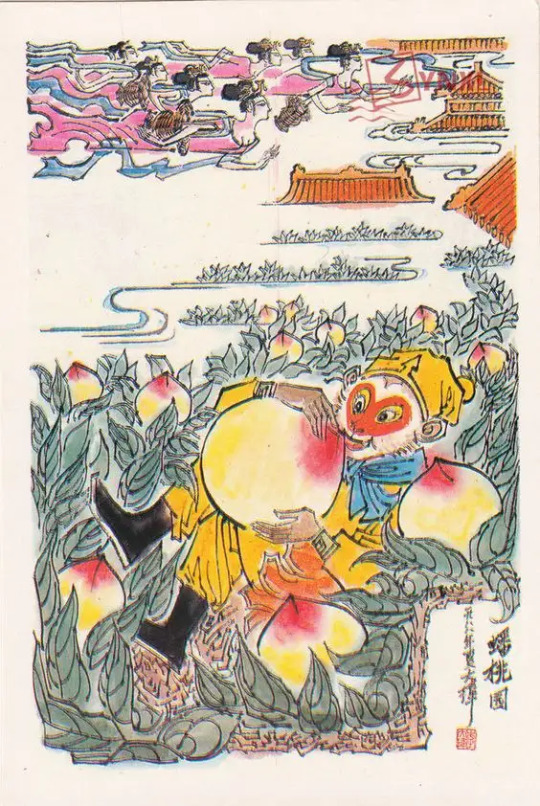
A new years print found online.
4) Immortal Wine - Ch. 5
Our Great Sage could not make an end of staring at the scene [the heavenly feast set for the Immortal Peach Banquet] when he suddenly felt the overpowering aroma of wine ... standing beside the jars and leaning on the barrels, he abandoned himself to drinking. After feasting for a long, he became thoroughly drunk...
[...]
[After returning to Flower Fruit Mountain and meeting with his children, he says] "When I was enjoying myself this morning at the Jasper Pool, I saw many jars and jugs in the corridor full of the juices of jade [yuye qiongjiang, 玉液瓊漿; lit: "Jade liquid and jade syrup"], which you have never savored. Let me go back [to heaven] and steal a few bottles to bring down here. Just drink half a cup, and each of you will live longer without growing old" ... He took two large bottles, one under each arm, and carried two more in his hands. Reversing the direction of his cloud, he returned to the monkeys in the cave. They held their own Festival of Immortal Wine [Xianjiu hui, 仙酒會], with each one drinking a few cups" (Wu & Yu, 2012, vol. 1, pp. 165 and 167).

A screenshot from the 1986 Journey to the West TV show.
5) Immortal Elixir - Ch. 5
[After Sun Wukong drunkenly stumbles into Laozi's laboratory in the Tushita Heaven] He found no one but saw fire burning in an oven beside the hearth, and around the oven were five gourds in which finished elixir was stored. "This thing is the greatest treasure of immortals," said the Great Sage happily. "Since old Monkey has understood the Way and comprehended the mystery of the Internal's identity with the External, I have also wanted to produce some golden elixir on my own to benefit people. While I have been too busy at other times even to think about going home to enjoy myself, good fortune has met me at the door today and presented me with this! As long as Laozi is not around, I'll take a few tablets and try the taste of something new." He poured out the contents of all the gourds and ate them like fried beans (Wu & Yu, 2012, vol. 1, p. 166).
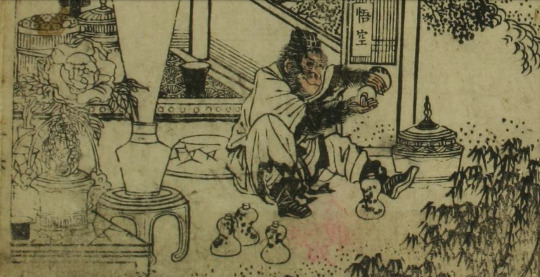
A detail from the 1835 Japanese translation of Journey to the West.
6) Ginseng Tree Fruit - Ch. 24
In the mountain there was a Daoist Abbey called the Five Villages Abbey [Wu zhuang guan, 五莊觀]; it was the abode of an immortal whose Daoist style [name] was Master Shenyuan [Shenyuan zi, 鎮元子] and whose nickname was Lord, Equal to Earth [Shi tong jun, 世同君]. There was, moreover, a strange treasure grown in this temple, a spiritual root that was formed just after chaos had been parted and the nebula had been established prior to the division of Heave and Earth. Throughout the four great continents of the world, it could be found in only the Five Villages Abbey in the West Aparagodaniya Continent. This treasure was called grass of the reverted cinnabar [cao huan dan, 草還丹], or the ginseng fruit [renshen guo, 人參果]. It took three thousand years for the plant to bloom, another three thousand years to bear fruit, and still another three thousand years before they ripened. All in all, it would be nearly ten thousand years before they could be eaten, and even after such a long time, there would be only thirty such fruits. The shape of the fruit was exactly that of a newborn infant not yet three days old, complete with the four limbs and the five senses. If a man had the good fortune of even smelling the fruit, he would live for three hundred and sixty years; if he ate one he would reach his forty-seven thousandth year.
[After Wukong learns the complicated method of harvesting the fruit] Parting the leaves and branches, he knocked three of the fruits into the sack ... The three of them [Monkey and his brothers] took the fruits and began to enjoy them (Wu & Yu, 2012, vol. 1, pp. 453 and 462-463).
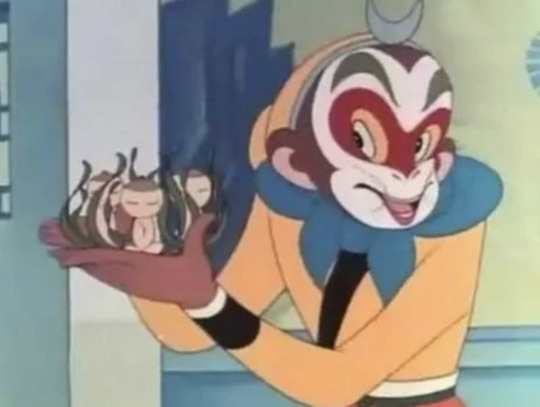
Monkey holding ginseng tree fruit. Image found online.
This previous article talks about the history of this magical fruit.
An important note
Sun Wukong is not really immortal, just long-lived and hard to kill. Immortality in Ming to Qing-era popular literature means that you can live for a long time but still die if injured badly enough. Think of it like an infinitely long candle being blown out instead of having a chance to burn for centuries or eons. For example, Investiture of the Gods (Fengshen yanyi, 封神演義, c. 1620), a sort of prequel to Journey to the West, is full of immortals killed in battle with heavenly weapons. Some even have their immortality sapped away before dying in one of many celestial traps. The biggest of these traps is the "Ten Thousand Immortal Array" (Wanxian zhen, 萬仙陣), so named because it can apparently kill myriad transcendents.
I commonly suggest that Monkey's levels of immortality just make him more durable than your average celestial.
Source:
Wu, C., & Yu, A. C. (2012). The Journey to the West (Vols. 1-4) (Rev. ed.). Chicago, Illinois: University of Chicago Press.
#sun wukong#monkey king#journey to the west#Chinese immortal#immortality#Chinese literature#Daoism#Taoism#Buddhism#fengshen yanyi#elixir#lego monkie kid#LMK
155 notes
·
View notes
Text
Do you ever just think about how many things Wu has to dismantle to create a democracy in the Earth Kingdom? Because I do, and I am constantly messed up about it.
In S3 E11 Ultimatum, when Mako and Bolin go to save their family from the riots in Ba Sing Se, Grandma Yin makes sure to grab a portrait of Queen Hou Ting that’s hung in pride of place in the home. She then hangs it back up once they’re on the airship and bows before it. This moment leads me to the belief that there is some kind of Imperial Cult, or organized nearly religious worship of the Royal family, in the Earth Kingdom.
And I just can’t stop thinking about how Wu would have to deal with that in the aftermath of everything. Because clearly not everyone reveres the Royal family, as evidenced by the mass looting at the fall of Ba Sing Se, but if there are people in the Earth Kingdom who worship royalty, like Yin does, then it throws a major wrench into democratization.
Even beyond that, every aspect of national pride or patriotism in the Earth Kingdom is based around the monarchy or it’s based around earth bending. And having national identity of some kind is important in political identity and participation. I just think this is a really interesting aspect of the post-LOK Earth Kingdom that I’ve never seen anyone engage with.
Wu doesn’t want to be king, but the monarchy is deeply entrenched, at least in certain areas. What are the cultural implications of being a political leader who is also a ceremonial figure, while actively trying to dismantle the whole system?
#avatar#avatar last airbender#avatar legend of korra#prince wu#king wu#earth kingdom#avatar the last airbender#my thoughts#my theories
10 notes
·
View notes